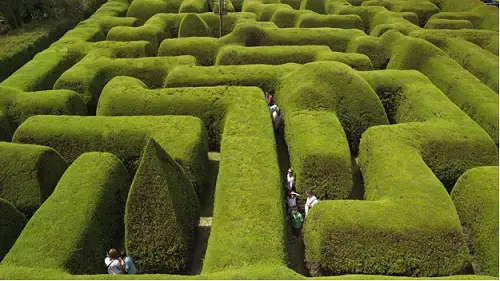|
TRANSLATE THIS ARTICLE
Integral World: Exploring Theories of Everything
An independent forum for a critical discussion of the integral philosophy of Ken Wilber
 David Christopher Lane David Christopher Lane, Ph.D.
Professor of Philosophy, Mt. San Antonio College Lecturer in Religious Studies, California State University, Long Beach Author of Exposing Cults: When the Skeptical Mind Confronts the Mystical (New York and London: Garland Publishers, 1994) and The Radhasoami Tradition: A Critical History of Guru Succession (New York and London: Garland Publishers, 1992). SEE MORE ESSAYS WRITTEN BY DAVID LANE

The Evolutionary Labyrinth
How we succeeded to be here now and its Existential Consequences
Reflecting on 13.8 Billion years of Navigating Nature's ever-changing life and death Mazes
David Christopher Lane
and Andrea Diem-Lane
“What sense is there in continuing when one has seen the future?”
— Alan Lightman, Einstein's Dreams
Perhaps one of the best ways to picture how we came to be is to think of a cosmic maze that changes moment to moment when you enter into it.
This past week we have been witnessing a buying frenzy for the Mega Millions lottery where close to 2 billion dollars will go to the winner(s) who picks the right combination of numbers. The odds, of course, are astronomically stacked against us since it is roughly estimated to be 300 million to 1.
The eventual winner(s) will undoubtedly be stunned when he/she/them hears the news. Yet, those lottery odds are nearly infinitely low when one stops to consider how rare it is for any one individual to be alive today, given what our unique configuration of DNA had to undergo before its final emergence. To win the Mega Millions sweepstakes is almost nothing compared to being alive today.
Perhaps one of the best ways to picture how we came to be is to think of a cosmic maze that changes moment to moment when you enter into it. Further imagine that each one of us (in terms of quantum structures) started our journey at the beginning this labyrinth some 13.8 billion years ago. But in order to successfully exit this massive puzzle, our atomic patterns had to compete at each turn with countless others in this life and death race to the end. What's more is that no one knows beforehand which pathway is a dead-end and which one leads onwards. The byways keep shifting in an unpredictable time-lock and the environmental conditions governing the onward journey continually modify, sometimes without any warning signals whatsoever.

Another way to look at this is to reverse our material sojourn backwards. We are here because of the recombination of our parents' genes and they in turn from their parents and so on for thousands of years. Yet, not once did anyone of our ancestors (and the pun here is intended) screw up. Ponder, for a second, just how many successes upon successes there must have been by necessity in our ancestral past without one hiccup.
Yet, what is often forgotten when thinking about this remarkable copulating streak is what each individual had to undergo to be finally successful. First, one must live past puberty in order to be able to replicate, which necessitates surviving for at least thirteen or so years. But even then, one has to to find a viable mate and make certain that your offspring don't die off too young. Yet even if they do live past puberty they must themselves pass on their genetic heritage, lest the line ends.
All of this and we haven't even touched upon the innumerable trials and tribulations that confront each individual daily. It is, for us, quite unimaginable since there are so many varied probations in the lineal descent of any fortuitous DNA strand.
What Charles Darwin and Alfred Russel Wallace realized, however, was that any organism that could sufficiently navigate nature's labyrinth would by dint of such victories be honed and shaped in the process. It is not that nature “selects” such winning combinations, but rather that those who are not eliminated in the proceedings get to carry on. What they carry with them, though, isn't necessarily the best, the strongest, or the most gifted characteristics. Herbert Spencer's famous and oft repeated dictum (later adopted by Darwin as a placeholder for natural selection in his fifth edition of On the Origin of Species) of “survival of the fittest” is a misleading codification. Rather, it may be more accurate to say precisely what it is, “survival of the sufficient.” What gets passed on is, at minimum, “good enough” and even here that often translates as just barely tolerable. Of course, we already know this since who we date and mate doesn't have to be the very best out of 3 billion possible spouses but merely what is acceptable at any one point in time. But even here our mediocrity must be suitable to endure the often-torturous journey we make to ensure our genetic transposal.
Today we are indeed the sum-total of those who came before us, and throughout nature's unending winnowing process we have been adaptively designed. As Alan Lightman insightfully pointed out we are living in an “accidental universe” and because of this those who can fruitfully multiply within such a cosmos will inevitably appear as if they were premeditatively constructed to do so. Yet, nothing is farther from the truth. Evolution is not an intention (it doesn't have a conscious plan), but is a descriptive recountal of looking backwards in attempting to explain what had previously transpired. As such, therefore, its predictive power is forever intertwined with changing environmental conditions—much of which cannot be foretold.
It is far easier to decipher via molecular biology what happened in the past than what will happen in the future. We are living in a probabilistic matrix which can be likened to Jorge Borges' “garden of forking paths” but with the added twist that such diverging paths are nearly unlimited.
Yet even though we may not be the most optimal of creatures, we are survivors nevertheless. And the odds that any one creature can be alive today is so stupendous, so overwhelming, that it can provide us with a moment (even if temporary) of glorious appreciation for the absolute wonder of it all.
We, the sighted, are the end result of a blind and senseless algorithm played out over a myriad of planetary possibilities. Arguably, we are conscious creatures in a cosmos that lacks such. Therefore, we find it difficult to find comfort in a universe that is both amoral and without sentiment, especially since our lives are so brutish and short.
This is our existential dilemma, and realizing the uniqueness of our present circumstance (even if such is an inadvertent trick of evolution after the fact) may be one of the surest ways of persisting in traveling through this cosmic labyrinth without giving up too soon.
Simply put, any organism that wakes up to this horror show of life is forced to find a purpose to continue living, even if the reasoning we conjure to support such ambitions is ultimately nonsensical. Otherwise, we will find ourselves down a dark alley without an exit. Hence, as the title of the 2009 dystopian novel suggests, we are “maze runners.” In sum, we are a determinate creature even if where we are running towards is climatically indeterminate.
“The tragedy of this world is that no one is happy, whether stuck in a time of pain or of joy. The tragedy of this world is that everyone is alone. For a life in the past cannot be shared with the present. Each person who gets stuck in time gets stuck alone.”
— Alan Lightman, Einstein's Dreams
Privacy policy of Ezoic
|  David Christopher Lane, Ph.D.
Professor of Philosophy, Mt. San Antonio College Lecturer in Religious Studies, California State University, Long Beach Author of Exposing Cults: When the Skeptical Mind Confronts the Mystical (New York and London: Garland Publishers, 1994) and The Radhasoami Tradition: A Critical History of Guru Succession (New York and London: Garland Publishers, 1992).
David Christopher Lane, Ph.D.
Professor of Philosophy, Mt. San Antonio College Lecturer in Religious Studies, California State University, Long Beach Author of Exposing Cults: When the Skeptical Mind Confronts the Mystical (New York and London: Garland Publishers, 1994) and The Radhasoami Tradition: A Critical History of Guru Succession (New York and London: Garland Publishers, 1992).
